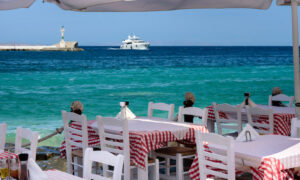Editor’s note: This diary entry about bartending in Berlin is the fourth installment in Loar’s Berlin work diary. See his first post here; his second here and his third installment here.)
Me: (Sliding a pint of Helles towards a guest) “Das Macht Sechs Vierzig” (6,40)
Guest: (Handing me a 10 Euro Note) “Macht Acht Fünfzig” (8,50)
Me: (Turns away from the guest towards Kasse, attempts to calculate change and tip quickly, silently enters a confusion spiral.)

This was a really good tip for one beer, especially in a culture where tipping is not necessarily compulsory. My automatic reaction should be cheerful, free and easy. But in the beginning of my time bartending in Berlin, this exchange brought my already mathematically challenged brain to a grinding halt. “Why are you making me do extra math?!?!?!” I would resentfully think. “If you want to leave a tip, just take your change and leave it on the bar, do you think I have the time to calculate both your change AND my tip as well as the correct amount of money for the house?!”
They didn’t tell me there’d be math ….
This, I would come to learn through practice on both sides of the bar, is an entirely normal process in Berlin. When paying for a meal or just a drink it is customary for one to verbalize the total amount, including the tip, leaving the bartender or waiter to figure out their gratuity on their own. This shouldn’t have been a hard adjustment for me to make, but this tiny alteration in an ever streaming flow of rapid fire transactions made me freeze in confounded numerical fear.
“Wait, do I . . . take the tip first and then give them the change?”
“Do I . . . give the change and then take the tip out of kasse?”
“Do I do both as close to simultaneously as possible, tossing the tip in the jar to make a satisfying clink sound followed by returning the guest’s change with a smile and a ‘Danke Dir!’”
After more than a year of slinging high end cocktails, fass bier and wine at Ratzeputz Bar, a hip spot in Neükolln, all of this is now automatic, a non-event that gives me no pause.
In the beginning, however, it felt like I had short-circuited part of my mind. I’ve always been terrible with math and this tiny workplace shift brought my number troubles into stark focus.
For a while I couldn’t understand the logic of this when it would be so much easier to just leave money on the bar, just like we do in New York City, where I tended bar for many years before moving to Berlin in 2020. Eventually, I embraced the extra step as part of the many small adjustments one must make as an Ausländer.
Sure it’s different than how we do things in Brooklyn, but this is bartending in Berlin; some things are just different, and that’s just the way it is.
Whisky sour? Sweet!
Guest: (Puckered face, returning a cocktail) “This is not sweet enough”
Me: “I’m sorry, what drink are you having?”
Guest: “A whisky sour”
Me: “So, you’d like it sweet?”
Guest: “Yes, sweet.”
As a professional bartender who cut his teeth in high volume bars of both the highest and lowest caliber, I’ve made thousands of whisky sours. This is a drink that serves as a great learning template for many other kinds of cocktails, as well as an introduction to how one might craft their own original libations. It’s also become one of the most ordered cocktails in Berlin as the city continues to catch up to the global cocktail craft. I have almost never had a drink sent back and this was the first time a whisky sour had been returned. Interestingly, it wouldn’t be the last.
It is somewhat of a culinary cliche that German food is bland and unimaginative (“koch” is the root German word for both “cook” and “boil”) and that the German palate has a proclivity for sweet things. Most natives I have encountered here also have a hypersensitivity to spicy food, so much so that what I would consider “mild” is often too strong and what they would consider “spicy” does not even register on my taste buds. This taste contrast would be revealed again and again later in the year when I introduced my Arbol Chili Infused Whisky and sent many guests reeling for water in tears.
I consider my perfectly balanced, not-too-sour-not-too-sweet whisky sour to be undeniably delicious and flawless. It’s called a whisky sour, it should be at least a little sour, no? Why would anyone order something with sour in the name of it and expect something more sweet?
After re-making the drink to the guest’s liking I remembered what I had learned before during my transaction troubles: this is bartending in Berlin, not Brooklyn. Things are different. I swallowed my superiority complex over the use of sugar and dialed up the sweetness just the tiniest bit. That did the trick. No more returned drinks, no more puckered faces.
Sometimes following the rules is a good thing ….
Me: (Blowing out candles, stacking chairs) “It’s last call, I’m going to be closing up, if you want anything else just let me know.”
Guests: (Obediently smile, finish their drinks in a reasonable amount of time and politely exit the premises with no fuss.)
Me: (Stares aghast at an empty bar, unsure of how or why this miracle has just happened, again.)
Getting people to leave a bar in New York City often seems impossible. I’ve been given the brush off, completely ignored and downright challenged when trying to get people to vacate the premises so I can count the money and lock-up, sometimes at five o’clock in the morning, after giving them plenty of extra time. On several occasions, I’ve actually stacked tables and stools directly around stubborn guests because there was simply no other task left for me to do. I’ve even brandished the keys to the front door and said as kindly as I could “I have to lock the door now and here’s the thing . . .you can’t stay.”
Because of a general lack of living space, New Yorkers have long considered bars and restaurants to be extensions of their living rooms. For many, when their favorite bar closes for the night, it’s like part of their home is being closed off to them, part of their soul. Regulars will try to leverage each other’s presence as a way to stay longer, as if silently saying “If you don’t leave, I won’t either.” On certain nights of the week, I would dread the closing process before I even began working, because I knew some so-and-so would be there posted up until the last minute, trying to squeeze every ounce of nightlife out of the place that they could.
In Berlin?
They follow the rules, just like the German stereotype says. I tell them they have to go soon, and THEY GO. SOON!
Night after night this happens, and it’s still a shock. Even on a Saturday night, when someone has had a tearful going away party and people have drunk themselves silly, they still follow the rules and respect THE LAST CALL. I say thank you. They say thank you. No resentment. No Entitlement. Just respectful people, enjoying drinks and a night out, following the rules.
Hallelujah.
As I carry on working behind the stick here in Berlin, I continue to notice tiny little differences in our collective culture of ordering, drinking, paying, meeting and gathering. I’ve adjusted and continue to be flexible.
After all, I’m a New Yorker to the bone and perhaps the saying is true: if I can bartend there, maybe I can bartend anywhere?

About the author:
Chris Loar is a comedian and artist living in Berlin. He was born in Torrance, California and called Brooklyn, New York home for 16 years before moving to Germany in 2020. A multi-hyphenate creator, Chris is also a passionate movie maker, Yoga teacher and cocktail bartender.
Follow him on Instagram at chrisloarcomedy
See more of Chris’s Berlin work diary here.
Read more on Dispatches’ Berlin archive here.














